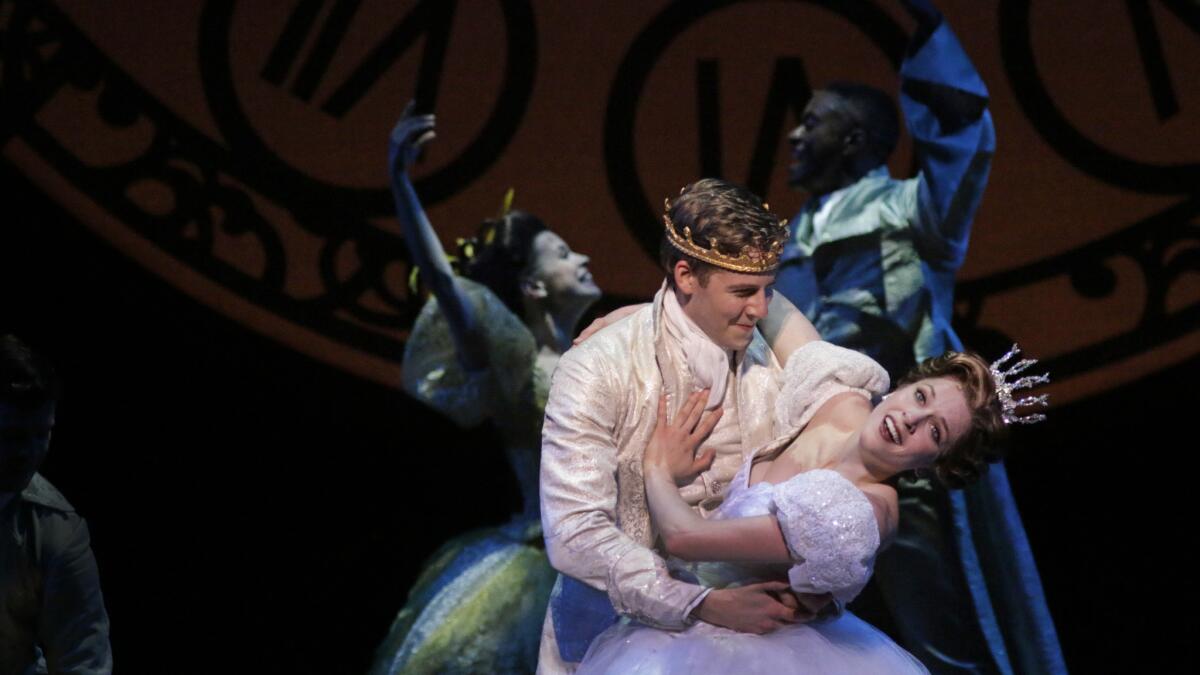Review: Enchanting ‘Cinderella’ brings happily-ever-after to Ahmanson

- Share via
Everything changes in this world — values, culture, technology, fashion — but the power of Cinderella seems weirdly impervious to time.
The new live-action Disney film has shown that the demure forest maiden is no shrinking violet at the box office, pulling in the kind of dough normally reserved for cape-wearing superheroes and homicidal maniacs.
At the opening of “Rodgers & Hammerstein’s Cinderella” at the Ahmanson Theatre on Wednesday night, a few young princesses were in attendance, all dressed up on a school night to relive the romantic adventure of a humble heroine transformed into a glittering swan and to pick up some merchandise to help flesh out the fantasy at home. (That sound you hear of credit card swipes at the Music Center is the latest proof of the tale’s indestructibility.)
Rodgers & Hammerstein’s musical version of the classic fairy tale was made for television, reportedly hauling in an audience of more than 100 million when it was done in 1957 with Julie Andrews. The show has been remade for television, with Lesley Ann Warren and Brandy both getting their turn at wearing the Manolo Blahnik-trumping glass slippers.
But it took till 2013 to get Rodgers & Hammerstein’s television sensation to Broadway. Playwright Douglas Carter Beane (“The Nance,” “The Little Dog Laughed”) has supplied a wisecracking new book, and there has been reworking of the sumptuous score, still the musical’s greatest asset.
This Broadway touring production stars Paige Faure as Ella (nicknamed Cinderella by her stepmother for standing near the cinders of the fire). She’s a kindly soul, always giving alms to the needy and returning kindness even to those who hurl abuse at her.
Faure has a lovely voice and an appealingly modest stage presence. When she sings of the life of the imagination in “In My Own Little Corner,” it’s easy to daydream along with her to more joyful worlds than the miserable home she’s stuck in. Cinderella’s happily-ever-after ending is assured, but Faure makes you care again about her perilous journey. Better still, goodness in her hands turns out to be a charm as potent as a Fairy Godmother makeover.
Reprising her Broadway performance, sitcom star Fran Drescher plays Madame, the evil stepmother, who married Cinderella’s father for his money and turned his daughter into her household slave after he died. Audiences seem to delight in hearing the buzz-saw Queens accent of “The Nanny” star in person, but Drescher has trouble adjusting her brand of comedy for the stage. She makes the mistake of trying to go even bigger, and as a result her voice sounds completely hoarse and her gestures empty and overblown.
Madame is still hoping one of her own daughters, either Gabrielle (Kaitlyn Davidson) or Charlotte (Aymee Garcia), will ensnare the Prince. But these ladies are given a new image by Beane, who tries to gently update the gender politics of the show while heightening the campier aspects of the storytelling. (These impulses are sometimes at odds, but it’s hard to get too worked up over material as fantastical as this.)
Gabrielle, endowed now with a conscience, falls for bumbling firebrand reformer Jean-Michel (David Andino operating in Josh Gad mode from “The Book of Mormon”) and offers sly assistance to Cinderella after she loses hope. Charlotte, as selfish and mean as her mother, is given to ridicule, but she has reason to be nasty because she’s treated like a sight gag by the production for her corpulent size.
Kecia Lewis brings a powerful operatic voice to the role of Marie, the woodland beggar who turns out to be Cinderella’s Fairy Godmother. Powering through the lush numbers “It’s Possible” and “There’s Music In You,” she convinces Cinderella that her dreams are within her grasp.
In addition to the beautiful singing, Faure’s scenes with Lewis are notable for some incredible wardrobe coups. The gowns designed by William Ivey Long are stunning, but the quick-change action by which they are donned is just as bewitching — and as frolicsome as the animal puppets enlivening the outdoor scenes.
Topher (Andy Huntington Jones) isn’t your usual Prince. He’s dashing but flamboyantly diffident. This is cute in an unexpected way, and it gives his character a journey of self-discovery that parallels Cinderella’s.
Beane’s book does away with the Prince’s parents and introduces a manipulative regent figure named Sebastian (Branch Woodman, working the cartoon villainy for all that it’s worth). The Prince has been kept ignorant of the state of his kingdom, but through his encounters with Cinderella he discovers how badly the poor are being treated and decides to take matters into his own hands.
Mark Brokaw’s production, with its quick-assembly storybook set by Anna Louizos, hadn’t settled into the Ahmanson by Wednesday’s performance. Josh Rhodes’ choreography looked clumsy, and the actors seemed as though they were trying to figure out the dimensions of the house.
But the story’s natural enchantment is greatly enhanced by the music of Richard Rodgers and the lyrics of Oscar Hammerstein II, who wrote the original book. (David Chase’s music supervision is assured throughout.) When the Prince and Cinderella swooningly sing “Ten Minutes Ago” or “Do I Love You Because You’re Beautiful” (with its magnificent second line, “Or are you beautiful because I love you?”), fault-finding falls by the wayside.
This production of “Cinderella” is slapdash and strangely snarky in places, but it does the trick of plunging us back into the restorative and timeless pleasure of make-believe.
Twitter: @CharlesMcNulty
More to Read
The biggest entertainment stories
Get our big stories about Hollywood, film, television, music, arts, culture and more right in your inbox as soon as they publish.
You may occasionally receive promotional content from the Los Angeles Times.











